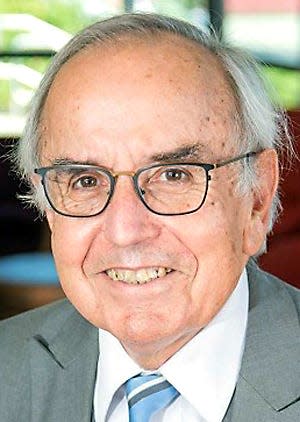Arthur Cyr: Secretary of state makes time for Africa
- Oops!Something went wrong.Please try again later.
- Oops!Something went wrong.Please try again later.
Secretary of State Anthony Blinken started the new year with a sensible, and productive, visit to Africa. In late January, he traveled to Cabo Verde, Ivory Coast, Nigeria and Angola. The purpose is to pursue long-term strategic ties with African nations, with emphasis on partnership and economic development.
For many years, China has devoted sustained attention to that continent. When the Sino-Soviet split occurred in the late 1950s, Beijing made the strategic decision to focus on poor non-white nations. Prominence of China today in Africa is in part a legacy of the fundamental split more than a half-century ago between the two principal communist powers during the Cold War.

In Cabo Verde, emphasis was on the fact that the nation has completed two Millennium Challenge Corporation compacts, and is beginning a third. These involve U.S. grants for promising economic development projects. The nation has also been declared malaria-free by the World Health Organization.
In Ivory Coast, emphasis was on new regional security efforts. The nation borders three others that have suffered recent coups — Burkina Faso, Guinea and Mali. Likewise, the visit to Nigeria involved security. Last July, the military in bordering Niger ousted the elected civilian leadership.
Angola is the scene of a major new agreement on private investment, which the Biden administration is treating as a priority. The Lobito Corridor rail project is financed by African and European in addition to U.S. investment sources. The large-scale construction project is expected to be profitable, and provide a positive counterweight to some of China’s “Belt-and-Road” projects, which have suffered from shoddy construction, harsh loan terms for recipient nations, and commercial losses.
During the later phase of the Cold War, the U.S. government supported Angola rebels fighting a government supported by the Soviet Union and Cuba.
Historically, Americans have been absent-minded about Africa. Past presidents generally focused on other parts of the world, with notable exceptions. Senator John F. Kennedy (D-MA) was chairman of the African Affairs Subcommittee of the Senate Foreign Relations Committee, attentive to that responsibility, and carried concern about Africa into the Oval Office.
President Jimmy Carter in office and afterward steadfastly worked with Africa projects. The Carter Center has devoted sustained emphasis to public health and related problems of that continent. One dramatic result is the virtual eradication of guinea worm, a devastating, agonizing disease. Carter effectively leveraged his center’s efforts into World Bank work targeting the disease.
Former President Bill Clinton achieved rockstar status in Africa, a popular stop in his travels on behalf of the Clinton Foundation. Presidents George W. Bush and Barack Obama devoted at least periodic attention to the continent while in office, reflecting the changing times.
President John F. Kennedy deserves credit for establishing the Peace Corps, a concept promoted by former First Lady Eleanor Roosevelt and Senator Hubert Humphrey (D-MN). The Peace Corps is remarkably durable, today involving selfless volunteers ranging widely in age.
Related, enormous growth in private philanthropy means there are unprecedented opportunities to raise living standards across Africa. Basic safety and security, however, sometimes is challenging.
Terrorists generate ongoing death, destruction and headlines, but have yet to demonstrate appeal to the average person in Africa — or elsewhere on the globe. By contrast, private economic development and investment, along with representative government, is slowly growing.
The world is moving in our direction.
Learn: Former First Lady Mrs. Eleanor Roosevelt talks with President John F. Kennedy: jfklibrary.org/asset-viewer/archives/jfkwha-014.
— Arthur I. Cyr is author of “After the Cold War – American Foreign Policy, Europe and Asia” (NYU Press and Palgrave/Macmillan). Contact acyr@carthage.edu.
This article originally appeared on The Holland Sentinel: Arthur Cyr: Secretary of state makes time for Africa
